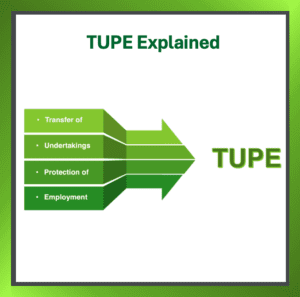Understanding TUPE: A Comprehensive Guide
The Transfer of Undertakings Protection of Employment Regulations 2006, commonly known as TUPE, is designed to safeguard employees when there is a change in business ownership. TUPE ensures that employees retain their existing terms and conditions, along with their employment continuity, post-transfer.
When Does TUPE Apply? TUPE is applicable in the following scenarios:
- A business or a part of it is transferred to a new owner or merges with another entity to form a new employer.
- A client takes over activities previously managed by a contractor.
- A contractor assumes activities from a client.
- A new contractor takes over operations from an existing contractor.
When TUPE Does Not Apply
- Only assets of a business are transferred.
- There’s a change in the business’s identity.
- The transfer occurs outside of the UK.
- The transfer is through a share takeover.
- Services are procured from a contractor on a one-time basis.
Employee Liability Information The current employer must provide the following details to the new employer:
- Identity and ages of transferring employees.
- Details of any applicable collective agreements.
- Employment particulars.
- Records of disciplinary actions or grievances in the past two years.
- Any legal actions by transferring employees in the past two years, along with potential legal actions.
Consultation and Notification The existing employer must inform affected employees about:
- The occurrence of a transfer.
- The reasons and expected timeline for the transfer.
- Implications for employees.
- Measures anticipated by the current and new employer regarding employees.
Consequences of Failing to Consult and Notify Non-compliance can lead to a protective award of up to 13 weeks’ pay. Employees must file any complaints with a tribunal within three months of the transfer. If an employee objects to the transfer, they effectively resign and forfeit certain employment rights, including redundancy payment.
Post-Transfer Changes The new employer cannot alter an employee’s terms and conditions due to the transfer itself. Changes are permissible only for ‘economic, technical, or organisational reasons’ ETO that involve workforce or workplace changes, like redundancies or positional shifts. Employee consent is required for such changes.
Understanding ETO:
- ‘Economic’ pertains to company performance.
- ‘Technical’ relates to equipment or processes used.
- ‘Organisational’ involves company structure.
Employers should maintain ongoing engagement with affected employee’s post-transfer. In case of potential redundancies, employers must continue to inform and consult appropriately.
For more guidance, please feel free to get in touch. Download our TUPE factsheet HERE

